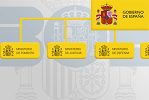Work placements
Content
What are work placements and what are they for?
The main objective of university work placements is to allow students to work as trainees in public administrations and private enterprise, in order to:
- Foster the employability of future professionals and increase their entrepreneurial, creative and innovation capabilities; and
- Offer a response to the economic transformation commitment based on the knowledge society.
External university work placements are a form of training carried out by university students and supervised by universities. The purpose is to enable students to apply and supplement the knowledge they have acquired during their academic training, by encouraging them to acquire skills that will prepare them for work, facilitating their employability and promoting their entrepreneurial capabilities.
Where can external work placements be done?
They may be done at the university itself or at collaborating organisations such as companies, institutions and public/private entities at national and an international level.
What type of employment relationship exists in an external work placement?
Given the educational nature of external university work placements:
- They never involve obligations that arise out of an employment relationship,
- Their content cannot be interpreted as replacing an employment relationship that corresponds to a job.
What happens if, on completing the work placement, the student joins the staff of the collaborating organisation?
In addition, if, on completing their studies, the student joins the staff of the collaborating organisation:
- The placement period does not count for the purposes of seniority in the company unless expressed otherwise in the applicable collective agreement.
For work placements completed in the field of public administration
External university work placements completed in the field of public administration, bodies governed by public law and other public organisations:
- Will not be taken into account for the purpose of admission to the civil service;
- Will not count for the purpose of seniority or recognition of previous service.
Types of work placements
External university work placements may be curricular or extracurricular.
- Curricular work placements involve activities that are part of the syllabus.
- Extracurricular work placements can be completed by students on a voluntary basis during their training period and although their purpose is the same as curricular work placements, they are not part of the respective syllabus. Nonetheless, they will be taken into consideration in the European Diploma Supplement as determined by the applicable legislation.
Calls. Educational Cooperation Agreements
Educational Cooperation Agreements
For the purpose of carrying out external work placements, universities or, as applicable, the associated work placement management entities will sign Educational Cooperation Agreements with the collaborating organisations – companies, institutions and public/private entities at national and international level – and will encourage them to be accessible for students with disabilities to do work placements there, providing the necessary human, material and technological resources to ensure equal opportunities.
The agreements will establish the regulatory framework of the relations between the students, the collaborating organisation, the university and, as the case may be, the associated entity supervising the work placements.
Who organises the calls for work placements and who supervises them?
Every university organises the calls for work placements independently and they are normally supervised by what are known as Work Placement and Employment Offices (OPE), in conjunction with the universities themselves.
Is there a website listing all the calls for work placement programmes?
At present, there is no website that displays all the work placement programme calls, and the best solution is to access the website of each university and go to the respective section. The official websites of Spanish universities can be found on crue Spanish universities.
They can also be found by accessing foundations or large companies with relevant university work placement programmes such as Fundación Universidad-Empresa, Universia (Banco Santander), Vodafone, Deloitte or EY.
Dual mentions in official university education
Official university degree and Master’s qualifications may include a dual mention where there is a joint training programme between the university and a participating entity, such as a company, social or trade union organisation, an institution or government department.
The aim of this dual mention programme is to ensure that students have the right skills and overall training and to enhance their employability. In these cases, the university and the participating entity will have to conclude a Framework Agreement on Educational Cooperation, under which the training programme will be implemented.
Students who have opted to take a dual programme will undertake part of their training by carrying out paid work through a contract for dual university training.
Información por Comunidades Autónomas







Andalucía Aragón Asturias, Principado de Balears, Illes Canarias Cantabria Castilla y León Castilla-La Mancha Cataluña Ciudad de Ceuta Ciudad de Melilla Comunitat Valenciana Extremadura Galicia Madrid, Comunidad de Murcia, Región de Navarra, Comunidad Foral de País Vasco Rioja, La
Legal and/or technical references
-
Royal Decree 592/2014 regulating external university work placements for university students.

-
Royal Decree 822/2021 of 28 September establishing the organisation of university education and the related quality assurance procedure.

-
Royal Decree 1791/2010 approving the University Student Statute.

-
Royal Decree 557/2011 of 20 April 2011, approving the Regulations of Organic Law 4/2000, on rights and freedoms of foreigners in Spain and their social integration.

-
Universities Statute.











